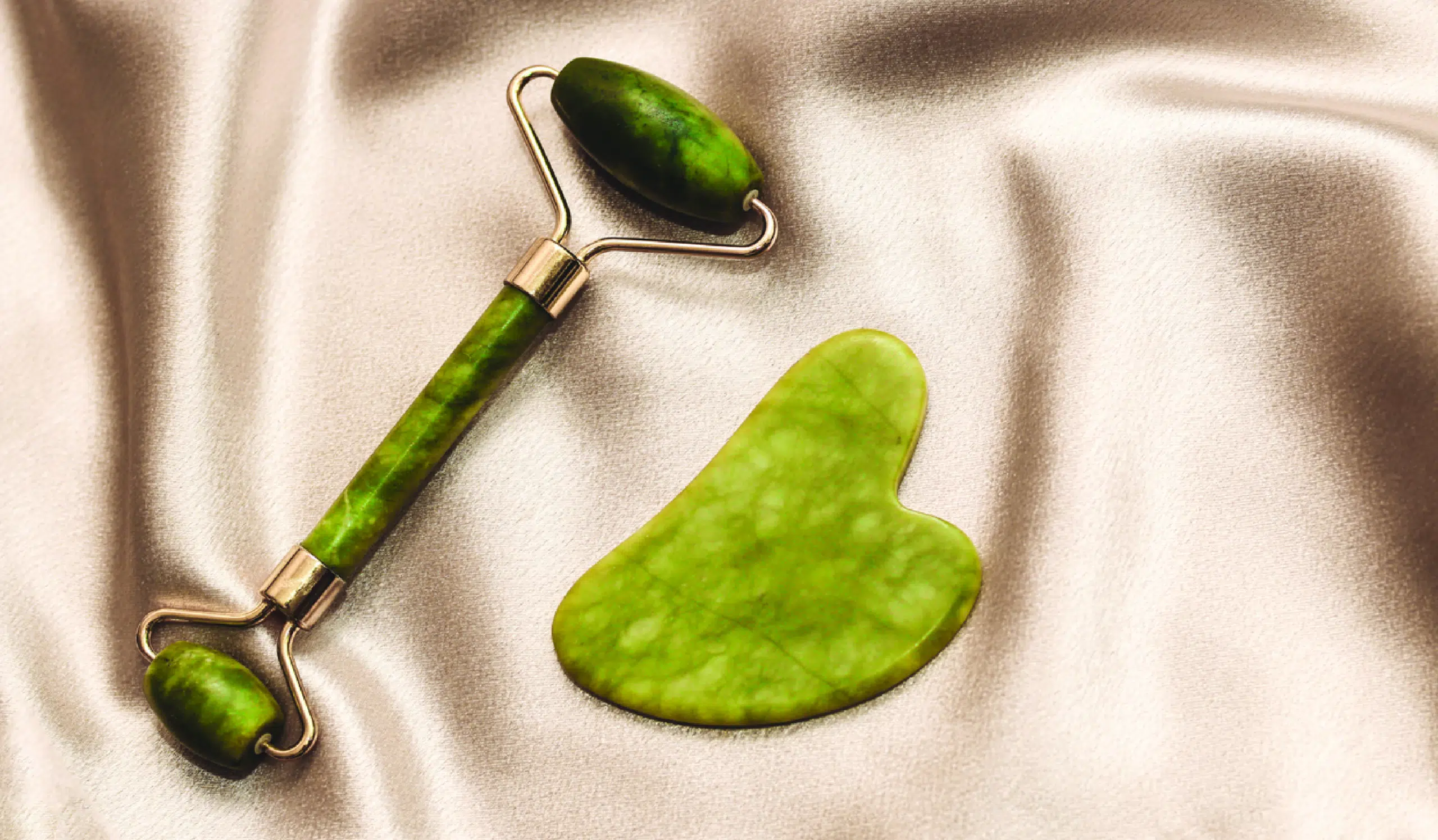Gua sha is great for lymphatic drainage, reducing facial puffiness, and evenly distributing skincare products across the skin. Despite the manifold advantages that gua sha has to offer, there’s one important consideration: it’s best to avoid this practice immediately after receiving Botox, certain dermal filler injections, or thread lifts. It turns out that using a gua sha tool too soon post-injection can have an impact on how a neuromodulator or dermal filler settles and, ultimately, the long-term results. In this article, we will delve into everything you need to know about combining gua sha with your favorite aesthetic treatments.
Gua Sha: A Quick Overview
Before we dive into the synergy between gua sha and aesthetic treatments, let’s briefly revisit what Gua Sha entails. This ancient Chinese practice employs a stone tool with smooth, contoured edges to stimulate the skin gently. Gua sha involves the gentle gliding or “scraping” of a specialized stone tool with contoured edges, typically made of surgical stainless steel, rose quartz, amethyst, or jade, across the skin. Women and men alike have incorporated this technique into their daily routines to unlock its potential benefits. The technique promotes lymphatic drainage, reduces facial puffiness, and enhances the absorption of skincare products. These attributes have made it a beloved skincare practice among many beauty enthusiasts seeking a natural glow.
When to Use Gua Sha After Injectables and Threads?
Now, the question arises: when is the optimal time to perform gua sha in relation to aesthetic injections, such as Botox? The answer lies in patience and prudence.
Botox
Following Botox injections, it’s crucial to let the product settle and work its magic undisturbed. Immediately engaging in gua sha could inadvertently disrupt the neuromodulator’s placement, potentially affecting the outcome. To avoid this, it’s recommended to wait for at least 2 weeks before reintroducing gua sha into your skincare routine. Botox takes up to 14 days to reach peak treatment effect, so, therefore, pausing a gua sha routine should follow this golden rule as well.
Dermal Fillers
Dermal Fillers can take even longer to settle and harmonize into the surrounding facial anatomy. In general, while swelling and inflammation after a dermal filler treatment subsides after 2 weeks, it can take up to 4-6 weeks before fresh dermal fillers fully integrate into the neighboring tissues. This also depends on the facial area treated, the filler depth, and the filler type. Yes, gentle massage can be an important and effective part of a post-care treatment plan, especially when it comes to occasional lumps and bumps; however, unless specifically instructed or demonstrated by an aesthetic provider, it is best to avoid heavy manipulation of the healing product.
PDO Threads
The same theory applies to PDO thread lifts. PDO, which stands for Polydioxanone, is a biocompatible and absorbable material that has been used in the medical field for years, particularly in surgeries and sutures. PDO threads are fine, durable sutures that are strategically inserted into the skin to lift, reposition, and tighten sagging areas. These threads also stimulate collagen production, which, in turn, improves skin elasticity and texture. Again, PDO thread integration and initial collagen stimulation can take up to 4-6 weeks; therefore, you should abstain from heavy & direct gua sha manipulation in the treated areas for this time frame as well.
The Right Balance
While the harmonious blend of gua sha and neuromodulator injections requires a bit of timing consideration, it’s crucial to remember that both can complement each other beautifully when used sensibly. Gua sha aids in reducing facial puffiness and promoting healthy skin while neuromodulators, fillers & PDO threads effectively address wrinkles, volume loss & skin laxity. By striking the right balance and respecting the post-injection settling period, you can harness the full potential of these aesthetic procedures and the beauty-enhancing power of gua sha.
Benefits of Gua Sha and Sculptra
Interestingly, one dermal filler treatment may actually benefit from the use of gua sha. Sculptra, or poly-lactic acid, is technically classified as a “collagen stimulator,” as its main mechanism is to smooth fine lines & restore subtle volume by helping your skin matrix rebuild natural collagen over the course of 2 years. To help the even dispersion of fresh Sculptra product throughout the treated tissues, post-care instructions recommend massaging the injected area 5 times per day, for 5 minutes, for 5 days. Jade rolling is a wonderful way to do this; again, always consult your aesthetic practitioner on the amount of gua sha pressure & manipulation that should be applied to the treated areas.
In Summary
The resurgence of the ancient gua sha practice as a modern beauty ritual is a testament to its effectiveness in promoting healthy, radiant skin. The key to a successful partnership between gua sha and aesthetic treatments lies in timing and patience. By allowing aesthetic injectables and threads to settle undisturbed and incorporating gua sha wisely, you can enjoy the best of both worlds—maximizing the benefits of aesthetic treatments and achieving a vibrant, youthful appearance that’s truly timeless.
A General Guide to Help You Determine When to Use Gua Sha and Rolling:
Avoid Facial Gua Sha and Jade Rolling:
2-4 weeks after HA dermal fillers, pending treatment area
2 weeks after Botox-Type injectables
4-6 weeks after thread lifting procedures

